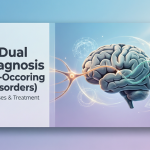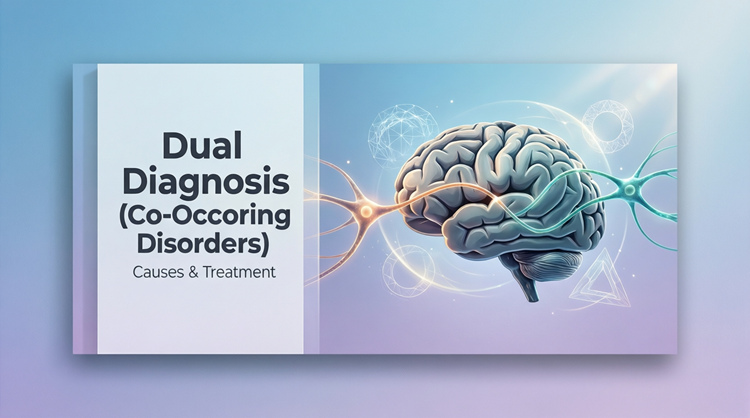People living with bipolar disorder as well as victims’ close contacts face persistent emotional fatigue together with various behavior-based challenges. Relationship tensions appear when manic episodes tighten against depressive phases causing potentially dangerous circumstances to develop. Your security along with your overall physical and mental well-being must stay your main focus because you should demonstrate understanding.
The blog serves as a protective measure for mental stability and emotional state and physical condition when meeting someone diagnosed with bipolar disorder. The foundation for a healthy relationship with protection for your well-being emerges through establishing boundaries when you receive comprehensive information along with suitable medical care regarding bipolar disorder.
What is Bipolar Disorder?
It is essential to understand bipolar disorder as a mental illness before establishing protective measures against it. Professional medical providers define bipolar disorder as a mood condition that leads patients to experience severe manic phases along with extreme depressive episodes.
Types of Bipolar Disorder
Bipolar I Disorder leads to severe mania which lasts one week or longer until medical hospitalization becomes needed.
Bipolar II Disorder – Hypomanic (less intense mania) and depressive episodes.
Cyclothymic Disorder manifests as regular mood shifts that produce symptoms lighter than those in a bipolar disorder.
These behavioral patterns enable you to predict forthcoming behaviors which allows better preparedness.
Here are 9 practical tips to help protect yourself when interacting with someone living with bipolar disorder:
1. Get Educated On Bipolar Disorder
Knowledge is power. Find out about bipolar disorder symptoms, bipolar disorder types (ther are 3), Bipolar I, Bipolar II, Cyclothymic Disorder, what Bipolar mania and Bipolar depression mean. By understanding the condition, you can differentiate between those actions influenced by the disorder and those actioned intentionally, so that you can respond appropriately to the behavior.
2. Set Healthy Boundaries
When someone has mood swings it is important to establish boundaries that are clear and healthy. Be clear what behaviour is allowed and what isn’t. If their actions are unruly, or harmful, make sure you prioritize your safety and take steps away from them or get help if you can.
3. Don’t Personalize Their Behavior
In manic or depressive episodes, the person might act irrationally, say mean things or make bad choices. These behaviors are due to the disorder, remember. You don’t have to take such actions personally; you can also have empathy while being in emotional distance when needed.
4. It encourages Treatment and Medication Adherence.
Therapy and bipolar disorder medication for many people with bipolar disorder work. Faith in them enough to guide them to follow their treatment plan and going to the therapy bible. But don’t answer in the role of a caretaker or therapist yourself.
5. Learn to recognize Triggers and Warning Signs.
Find out what triggers may cause you to go into a mood swing, and learn to recognize when an episode is looming. Triggers are common sleep deprivation, stress or substance use. But by recognising these signs early, you can do something to help protect yourself, and provide support that is right for each individual.

6. Practice Self-Care
That means when you’re supporting someone with a mood disorder, you better take care of your own mental and physical health. Do things that make you relax and recharge. Talk to trusted friends, family or mental health professionals about your feelings and experiences, and seek support.
7. Keep at Open and Honesty Communication
Inform your person with respect and open ends your concerns and limits of intimacy. Address what their behavior does to you with “I” statements, like, “When you yell in an argument it makes me crazy.” Mutual understanding and the reduction of conflict always come from clear communication.
8. Do not Enable Harmful Behaviors
Empathy is great, but you don’t want to enable behaviors that make the situation worse. I In other words, don’t say you’re solving the problem if you aren’t. Don’t shove the unmanageable, such as drinking, taking drugs or being loose with the money. Have compassion with responsible and accountable behavior.
9. Seek Professional Support
When bipolar disorder relationships become overwhelming search for a specialist therapist or counselor who treats bipolar disorders. The supportive network helps with addressing challenging situations and avoids putting your personal health at risk.
100% Confidential Support is Available 24/7
No matter what you’re going through, you’re not alone. Our dedicated team is here to provide a safe, judgment-free space where you can talk openly and honestly. Whether you need emotional support, resources, or just someone to listen.
We’re here for you—completely confidential and always respectful of your privacy. Call us today!
Conclusion
The treatment process of bipolar disorder needs active self-care together with patience and empathy toward the affected person. The most you can achieve is to educate yourself about bipolar disorders and establish protective measures during your support efforts for treatment programs within a healthy relationship.

Deland Treatment Solutions provides complete bipolar disorder management solutions through personalized support at every treatment stage for their patients. Professionals at our center can help you and others facing bipolar disorder by contacting (386) 866-8689 for therapy and treatment services.





















